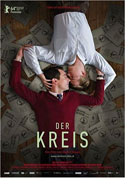The Circle (“Der Kreis”)
Zürich, mid-1950s. Since Ernst, a shy young teacher, is hoping to secure a permanent position at a girls’ school, it behooves him to keep his interest in other men secret. Lonely and in the closet, he stumbles across a secret homosexuals‘ organization called Der Kreis (The Circle). Delighted and relieved to find other gay, literary-minded men like himself, he begins writing for the Circle‘s magazine, which has readers all over the world. Zürich is a free-wheeling place for the time; Switzerland is more permissive toward gays than other countries like Germany, where the infamous Paragraph 175 would make homosexual acts between males illegal until 1994. At one of the Circle’s legendary balls, Ernst falls head over heels in love with a sensitive cabaret artiste and drag queen named Röbi.
Although the Circle continues its activities unmolested for a while, the murders of two gays – supposedly by hustlers – leads the Swiss police to begin registering homosexuals. Fear and blackmail threaten to destroy the middle-class existences of the Circle members. Against this backdrop, Ernst and Röbi enter into their own love story that will last a lifetime.
Der Kreis has an unusual construction. The 1950s story plays out in a series of flashbacks, narrated by the real Ernst Ostertag and Röbi Rapp, in which actors portray their younger selves. The device takes some getting used to; at first it’s not clear which of the older gentlemen – delightful storytellers now in their mid-80s – is played by which young actor. But once you get everyone straight, you’re in for a lovely film. Matthias Hungerbühler and Sven Schelker (a member of Thalia Theater’s ensemble) are extremely convincing as the starry-eyed youngsters. Marianne Sägebrecht is delightful as Röbi’s bighearted Mama. The warm production design by Karin Giezendanner feels authentic.
As inconceivable as it is that people were subjected to such indignities by the Swiss police, it’s even more inconceivable that gays are still being harassed and persecuted in places like Russia and Uganda. After 60 years together, Ernst and Röbi are finally comfortable in their own skins – living proof of love’s ability to conquer all.
Der Kreis won the TEDDY prize for best documentary film and the Panorama audience award at the Berlinale, plus audience awards at festivals in Boston and Freiburg.
Posted on KinoCritics website




